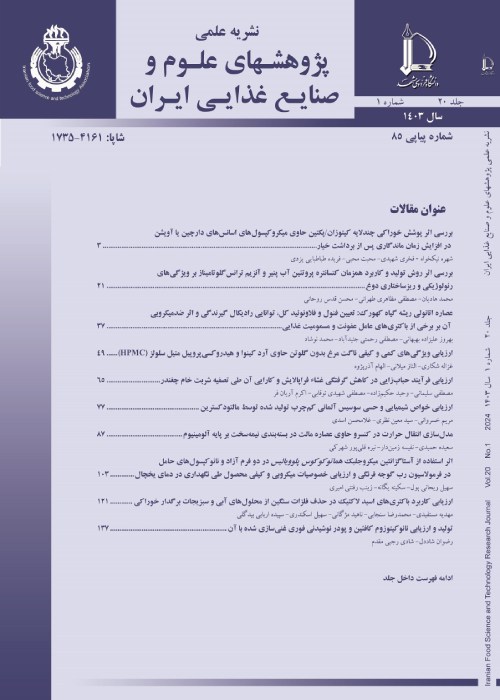Investigation of Psychochemical and Functional Properties of Pomegranate (Punica granatum (L.) cv. Rabab) Juice Concentrate during Storage Period at Different Temperatures
Author(s):
Article Type:
Research/Original Article (دارای رتبه معتبر)
Abstract:
Introduction
The pomegranate (Punica granatum L.) belongs to the family Punicaceae, which is planted around the world in different microclimatic areas. The pomegranate production has grown uninterruptedly, which is presumably due to the increasing consumer awareness of the benefits attributed to pomegranate and its polyphenols. Pomegranate fruit has valuable compounds with functional and medicinal effects like antioxidant, anticancer, and anti-atherosclerotic effects. Storage of juice concentrate can have a dramatic impact on physicochemical quality. The bioactive compounds and antioxidant activity in fruit juice products are influenced by many external factors like different storage temperatures. Knowledge of the rheological behaviour of juice products is essential for product development, design and evaluation of process equipment like pumps and piping. Pomegranate concentrate is so susceptible to the condition of storage, which results in a reduction in consumer acceptability and quality losses. Accordingly, the industrial concentrate stores frozen (-20 °C) which has a lot of costs to the producer. The objectives of this study were to evaluate the degradation visual color, the rheological characteristics of pomegranate juice concentrates, the stability of phytochemicals, the antioxidant activity, and the haze formation of reconstituted pomegranate juice concentrate during storage at different temperatures to determine the best storage conditions to reduce the quality losses and solving the problem about high cost of storage.Materials And Methods
The concentrated pomegranate (Punica granatum (L.) cv. Rabab) juice used in this study supplied from Narni (Green farm, Neyriz, Iran) factory. The pomegranate juice concentrate was poured into falcons for measuring physicochemical attributes, and micro tubes for determination of antioxidant activities. Then the samples were divided into four parts and stored equally in four different temperatures (-20, 4, 20, and 35 °C). The control samples were stored at -80 °C as fresh sample for the storage period (140 days). Folin-Ciocalteu reagent and 2,2-diphenyl-1-picrylhydrazyl radical (DPPHº) were supplied from Sigma-Aldrich Company (St. Louis, MO, USA). All other chemicals were of analytical grade and purchased from Merck Company (Darmstadt, Germany). The total soluble solid (TSS) was determined with a digital refractometer (Carl Zeiss, Germany). Total insoluble solid was measured by centrifugation at (5,000 × g) according to the IFFJP method 60, using a high speed centrifuge (Ibarz et al., 2011). The haze formation of reconstituted juice was determined by settling in a glass tube for 3 hour at room temperature. Color measurements of the juice samples were carried out using a HunterLab (CHROMA METER CR-400/410, KONICA MINOLTA, Japan) after dilution. The rheological characteristics of the pomegranate juice concentrate stored in different temperatures were studied by using a computer controlled rotational viscometer. Sample compartment was monitored at a constant temperature (25°C) using a water bath/circulator, while TSS was 65 °Brix. The viscosity measurements, was carried out According to the methods described by Cárdenas et al., (1997), using a Brookfield cone and plate viscometer (DVII pro Brook field, USA) between the shear rate of 0.5200 (1/s). Total phenolic content of samples was measured according to the Folin-Ciocalteu colorimetric method (Sun et al., 2007). Total flavonoid content in juices was determined via a spectrophotometer according to the method of Chang et al. (2002). Radical scavenging activities of the samples were measured by using DPPHº as described by Mazidi et al., (2012). The ferrous ion reducing antioxidant power (FRAP) of the samples was measured calorimetrically according to the method by Fawole and Opara (2013). All analyses were performed by the Statistical Analysis System (SAS) software V 9.1 (SAS Institute, Inc., Cary, NC, USA). By using the analysis of variance (ANOVA), the differences among means were determined for significance at PResults And Discussion
The industrial pomegranate juice concentrate stored at (-20, 4, 20, and 35 °C) for 20 weeks, and some physicochemical properties like the second turbidity, CIE Lab color parameters, the rheological properties, the bioactive component (total phenolic and flavonoid contents), and antioxidant properties (FRAP and DPPH) investigated in order to determine the best condition of storage. The second turbidity was obvious among the samples stored at 35 °C in the last fourth weeks. Although there were no significant differences among L* value of the samples stored at -20, 4, and 20 °C, a* and b* value of the samples stored at -20 and 4 °C had the same reduction trend for 14 weeks. Even though the control samples had shear thinning behavior, the samples showed a dilatant behaviour after storage. Antioxidant activities measured via DPPH and FRAP sowed reduction with increasing time and temperature. Flavonoid content increased by increasing time and temperature. In conclusion, storage at 4 °C for 14 weeks was the best storage condition to keep the quality and reduce the costs.Keywords:
Language:
Persian
Published:
Iranian Food Science and Technology Research Journal, Volume:13 Issue: 5, 2017
Pages:
820 to 829
magiran.com/p1765148
دانلود و مطالعه متن این مقاله با یکی از روشهای زیر امکان پذیر است:
اشتراک شخصی
با عضویت و پرداخت آنلاین حق اشتراک یکساله به مبلغ 1,390,000ريال میتوانید 70 عنوان مطلب دانلود کنید!
اشتراک سازمانی
به کتابخانه دانشگاه یا محل کار خود پیشنهاد کنید تا اشتراک سازمانی این پایگاه را برای دسترسی نامحدود همه کاربران به متن مطالب تهیه نمایند!
توجه!
- حق عضویت دریافتی صرف حمایت از نشریات عضو و نگهداری، تکمیل و توسعه مگیران میشود.
- پرداخت حق اشتراک و دانلود مقالات اجازه بازنشر آن در سایر رسانههای چاپی و دیجیتال را به کاربر نمیدهد.
In order to view content subscription is required
Personal subscription
Subscribe magiran.com for 70 € euros via PayPal and download 70 articles during a year.
Organization subscription
Please contact us to subscribe your university or library for unlimited access!


